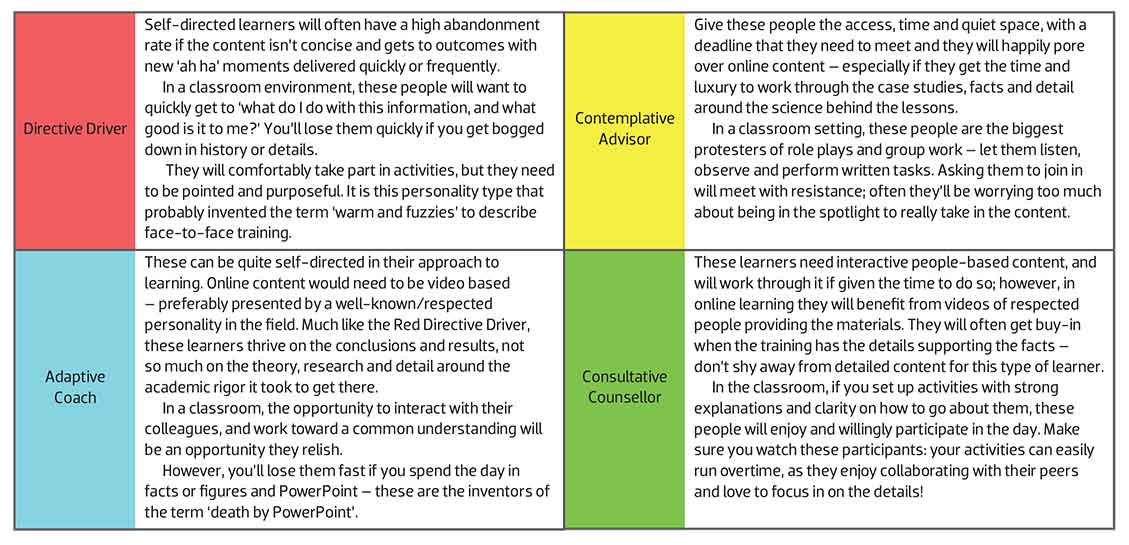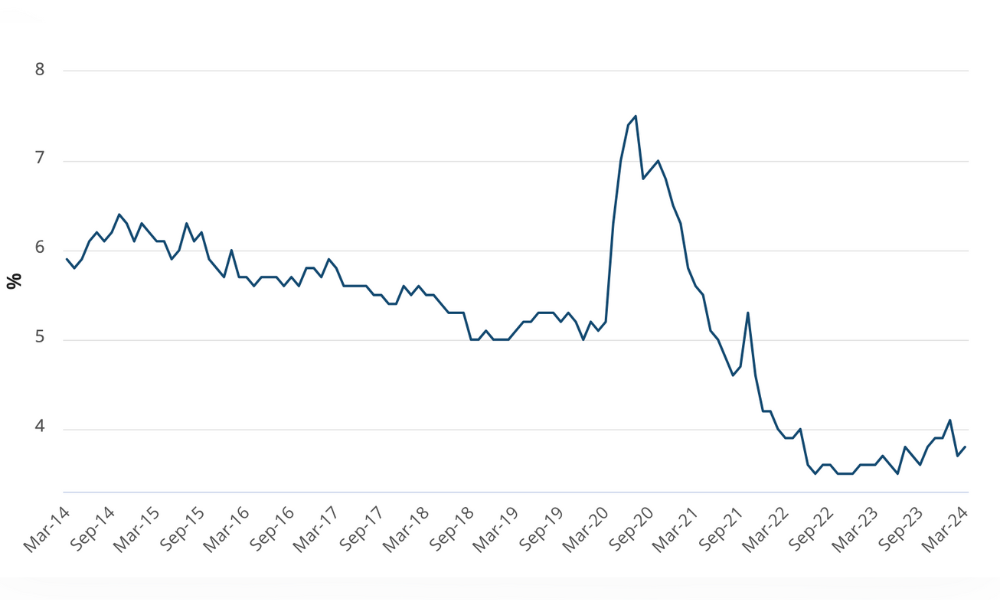We do it for everything from online dating to spotting the next generation of leader – why not apply the same personality profiling methodology to the learning experience?
You’ve no doubt witnessed it first hand – and you might even be guilty of it yourself. You attend a course or seminar and, full of enthusiasm, you take notes and nod your head at the wonderful insights being shared. Then you return to work… and you work. Anything you may have initially taken onboard in that training session gets forgotten.
According to the Ebbinghouse Forgetting Curve, the average participant begins forgetting what they’ve learned almost immediately without the use of any practical activities to support the new knowledge. This research was originally conducted in 1875, so this has been a problem for the ages.
The research suggests there is a 6-9 hour window before participants start to forget up to 50% of what they learned if they have not completed any practical activities related to the new information or skills.
How can this waste be minimised? Innovative learning models are shaking things up. pd training, for example, uses a model based on tying learning to personality types. They use real world examples supported by actual practical activities, either designed on the spot by professional trainers or planned as part of the complete learning experience.
While personality profiles have been used for years to identify potential leaders and to enhance team dynamics, they’ve rarely been used in the L&D space. Yet it makes a lot of sense: people do learn in different ways. Some prefer face-to-face; others are quite happy to do it online at their own pace. Some need guidance and support; others don’t.
Paul Findlay, managing director of pd training, says the best results come when the profiling is done prior to (or if necessary, at the start) of the training event.
“We use the insights to deliver the training in a way that is more tailored to the individual’s natural preferences; however, that’s only just the beginning,” he says. “By learning more about yourself and others in the context of a business course, the epiphanies people have about recurring scenarios can be life changing.”
#pb#
Using the personality profiling tool, every course is delivered to cater to the needs of clients and the individuals in the room on the day. This occurs to the extent that even if the same topic is being delivered to multiple groups in the same company, the delivery of each and every session will be based upon the personality type, needs, backgrounds and learning goals of the individuals in each training event.
Following the personality profile, participants have 24x7 access to peers, a range of training support materials (personality profiling report, courseware, course notes, videos, forums, training booster emails) and their trainer to assure that if they do start to forget anything, they have instant access to any type of support they require.
Here’s a snapshot of how personality impacts on learning

BENEFITS TO EMPLOYEES
Perhaps you’ve heard these common questions being asked in business courses – Findlay certainly has:
• Why do I always lose out in negotiations?
• Why does John always brush me off?
• Why don’t I ever get through my to-do list?
• If I could just learn what motivates Mary!
• Why are some people so much better at delegating?
• John and Mary really just butt heads – why is that?
• It makes me so mad that Peter never reads my emails, why won’t he?
Questions like these come up in different business courses all the time. Often, people are attending training that is focused on something unrelated, and Findlay suggests that the self-awareness and awareness-of-others that comes out through the profiling answers these questions and more.
“It’s commonplace for clients to tell us that the profiling part of the training was the most valuable thing they took from the training because they gained a true insight into their fellow team members and could now communicate better and understand why certain people conduct themselves that way they do.”
BENEFITS TO TRAINERS – AND EMPLOYERS
While the focus is naturally on the learners, the trainers also benefit from the insights gleaned from personality profiles. When you are delivering a communications or people focused course you often have participants attending from many different job roles, experience and seniority, with wildly different technical skills and personality types, so it’s difficult to guess how to run the session to suit their personalities until you get some insight about them – that’s where the profiling comes to the fore.
“You now know you should pick on x person to join in or lead discussion and y person to conduct some research. You can prepare and deliver courses that leaves each person feeling really connected and engaged by the content, thereby making the most of the time spent in training for each and every person in the room,” Findlay says.
“The whole purpose is to help individuals and their employers get the best possible impact from the time and money invested in training.”
pd training is an Australian-owned, international training and professional development services provider, with over 400 specialist trainers, delivering thousands of courses each year
According to the Ebbinghouse Forgetting Curve, the average participant begins forgetting what they’ve learned almost immediately without the use of any practical activities to support the new knowledge. This research was originally conducted in 1875, so this has been a problem for the ages.
The research suggests there is a 6-9 hour window before participants start to forget up to 50% of what they learned if they have not completed any practical activities related to the new information or skills.
How can this waste be minimised? Innovative learning models are shaking things up. pd training, for example, uses a model based on tying learning to personality types. They use real world examples supported by actual practical activities, either designed on the spot by professional trainers or planned as part of the complete learning experience.
While personality profiles have been used for years to identify potential leaders and to enhance team dynamics, they’ve rarely been used in the L&D space. Yet it makes a lot of sense: people do learn in different ways. Some prefer face-to-face; others are quite happy to do it online at their own pace. Some need guidance and support; others don’t.
Paul Findlay, managing director of pd training, says the best results come when the profiling is done prior to (or if necessary, at the start) of the training event.
“We use the insights to deliver the training in a way that is more tailored to the individual’s natural preferences; however, that’s only just the beginning,” he says. “By learning more about yourself and others in the context of a business course, the epiphanies people have about recurring scenarios can be life changing.”
#pb#
Using the personality profiling tool, every course is delivered to cater to the needs of clients and the individuals in the room on the day. This occurs to the extent that even if the same topic is being delivered to multiple groups in the same company, the delivery of each and every session will be based upon the personality type, needs, backgrounds and learning goals of the individuals in each training event.
Following the personality profile, participants have 24x7 access to peers, a range of training support materials (personality profiling report, courseware, course notes, videos, forums, training booster emails) and their trainer to assure that if they do start to forget anything, they have instant access to any type of support they require.
Here’s a snapshot of how personality impacts on learning

BENEFITS TO EMPLOYEES
Perhaps you’ve heard these common questions being asked in business courses – Findlay certainly has:
• Why do I always lose out in negotiations?
• Why does John always brush me off?
• Why don’t I ever get through my to-do list?
• If I could just learn what motivates Mary!
• Why are some people so much better at delegating?
• John and Mary really just butt heads – why is that?
• It makes me so mad that Peter never reads my emails, why won’t he?
Questions like these come up in different business courses all the time. Often, people are attending training that is focused on something unrelated, and Findlay suggests that the self-awareness and awareness-of-others that comes out through the profiling answers these questions and more.
“It’s commonplace for clients to tell us that the profiling part of the training was the most valuable thing they took from the training because they gained a true insight into their fellow team members and could now communicate better and understand why certain people conduct themselves that way they do.”
BENEFITS TO TRAINERS – AND EMPLOYERS
While the focus is naturally on the learners, the trainers also benefit from the insights gleaned from personality profiles. When you are delivering a communications or people focused course you often have participants attending from many different job roles, experience and seniority, with wildly different technical skills and personality types, so it’s difficult to guess how to run the session to suit their personalities until you get some insight about them – that’s where the profiling comes to the fore.
“You now know you should pick on x person to join in or lead discussion and y person to conduct some research. You can prepare and deliver courses that leaves each person feeling really connected and engaged by the content, thereby making the most of the time spent in training for each and every person in the room,” Findlay says.
“The whole purpose is to help individuals and their employers get the best possible impact from the time and money invested in training.”
pd training is an Australian-owned, international training and professional development services provider, with over 400 specialist trainers, delivering thousands of courses each year





